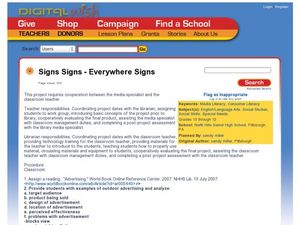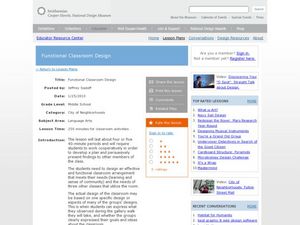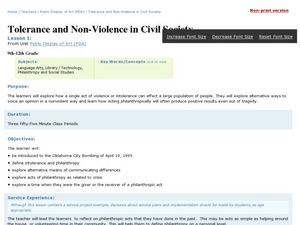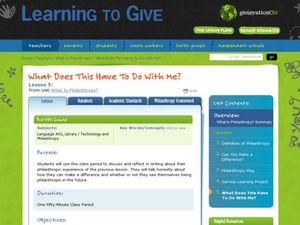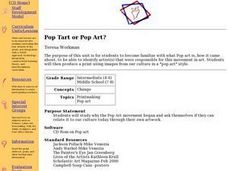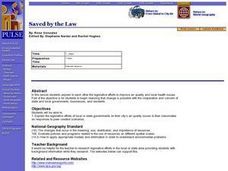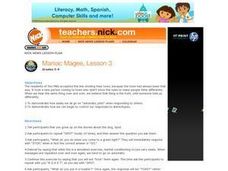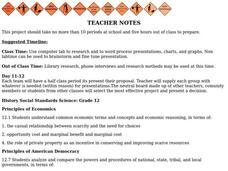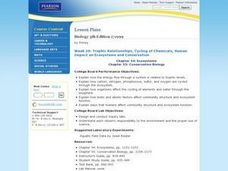Curated OER
Rosa Parks
Students examine the actions of Rosa Parks. They identify the reasons why philanthropy is good for the community and individuals. They write a letter to someone they admire because of their qualities.
Curated OER
Human Rights & Equal Opportunity Commission
Learners consider what human rights are. They comprehend the origins of modern human rights. Students appreciate the meaning and significance of the Universal Declaration of Human Rights. They appreciate the relationship between...
Curated OER
Opposites
Young scholars choose a category to discuss and write down the name of an activity that represents the various characteristics. They record their responses on a class sheet and discuss how it feels when someone disagrees with them. They...
Curated OER
Signs Signs - Everywhere Signs
Students examine advertising techniques. In this media literacy lesson, students collaborate to create PowerPoint presentations that feature multimedia formats to share advertising that is present in their community.
Curated OER
Functional Classroom Design
Learners work in groups to design an effective and functional classroom. In this classroom design instructional activity, students discuss community and make a mental map and sketch of their classroom. Learners complete a handout about...
Curated OER
Tolerance and Non-Violence in Civil Society
Learners explore the concept of philanthropy. In this Oklahoma City bombing instructional activity, students submit public responses to the event in order to consider how the tragedy prompted a positive reaction. Extension activities are...
Curated OER
The Lorax
Third graders identify and list five problems presented in The Lorax by Dr. Seuss. They relate these problems to current environmental issues and debate how to make a difference then participate in different activities to improve their...
Curated OER
Preserving the Past with Oral History
Students research history by interviewing people in their community. They create a list of questions and record their responses. They end the project with some type of final product which might include a memory book.
Curated OER
Anti-Arab Stereotypes, Discrimination and Hate Crimes
High schoolers discuss the stereotypes they have heard mentioned against the Arab community. Using examples, they identify the uses of discrimination, hate crimes or stereotyping these individuals. As a class, they discuss ways to...
Curated OER
Alike and Different
Second graders listen to a book about how farms feed the world. They discuss elements of rural life. They listen to a story about the suburbs and discuss elements specific to a suburban community. They listen to a story about city...
Curated OER
Introduction to Toxicology
Students explore the science of toxicology and the relationship between a toxic reaction (response) and amount of substance (dose). They observe two demonstrations illustrating the concept of dose-response.
Curated OER
Breakfast for Champions
Students prepare an event to honor philanthropic activities in their community. In this common good lesson, students send out invitations to local non-profits or to those who engage in philanthropic activities and plan an awards...
Curated OER
Taking Care of Business
Middle schoolers participate in a service project. In this stewardship lesson plan, students review the concepts of philanthropy and environmental stewardship. Middle schoolers practice being good stewards by researching public areas in...
Curated OER
What Does This Have To Do With Me?
Students examine how to make a difference in their community. In this philanthropy lesson, students discuss if one person can make a difference, brainstorm a list of actions individuals can take to make a difference and write an essay...
Curated OER
Just the Facts, Jack
Third graders listen to music and discuss their responses to different styles separating their comments into facts and opinions. They evaluate a worksheet of statements by classifying the statements into fact and opinion.
Curated OER
Pop Tart or Pop Art?
Students explore pop art. They research the history of pop art and identify artist (s) responsible for this movement. Students produce a print using images from our culture. Additional cross curriculum activities are included.
Curated OER
Saved by the Law
Students explain the legislative efforts of local or state governments on their city's air quality issues to their classmates as responses to peer-created scenarios. They determine that change is possible with the cooperation and...
Curated OER
Maniac McGee, Lesson 3
Students explore possible causes of stereotyping. In this multicultural awareness lesson, students participate in activities in which "conditioning" affects responses. Students compare their conditioned responses to possible community...
Curated OER
Out of the Dust
Students create a poem that expresses the physical and emotional turmoil of living through the Dust Bowl. In this Out of the Dust lesson, students research facts about the time period and discuss the cause-effect patterns...
Curated OER
Personal Development (Safety and Injury Prevention)
Ninth graders explain appropriate procedures for responding to personal, school, and community emergencies. They demonstrate basic first aid skills.
Curated OER
Communicating Values and History through Masks
Students create an African style mask that depicts a value or character trait that is important in their community.
Curated OER
American Democracy
Twelfth graders represent a specific interest in the business community and must present a plan that benefit the community and present the least amount of danger to the community. They must convince the city fathers that their venture is...
Curated OER
Learning Skills
Second graders role-play in a variety of different academic and social situations. In this social skills lesson, 2nd graders identify specific skills needed to succeed at home, in school, and out in the community.
Curated OER
Trophic Relationships, Cycling of Chemicals, Human Impact on Ecosystems and Conservation
Students explore how the energy flow through a system is related to trophic levels. They investigate how organisms affect the cycling of elements and water through the biosphere. Students participate in lab activities to observe ways...



